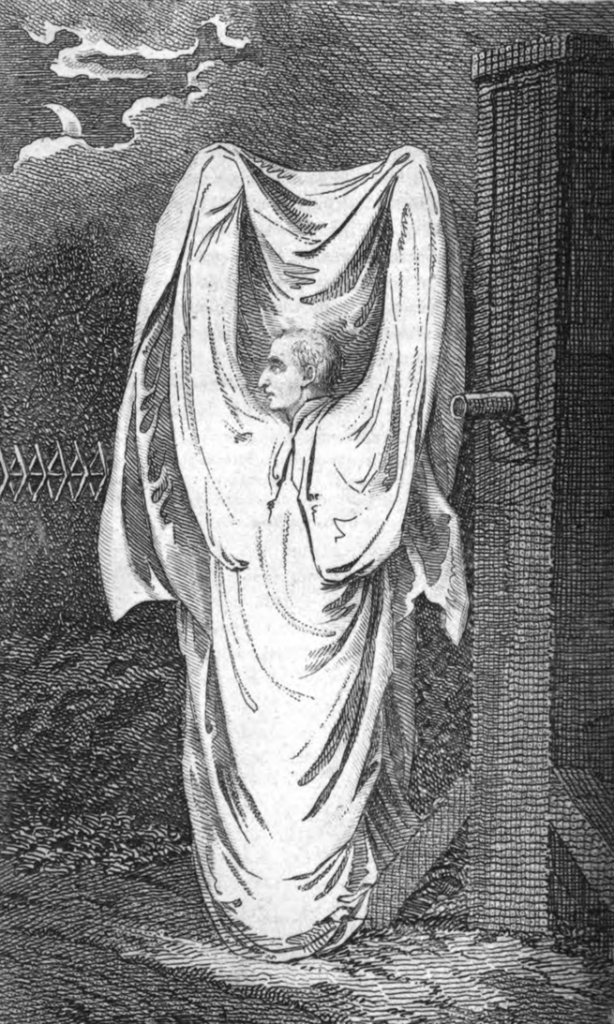-
Ghost
In folklore, a ghost (sometimes known as an apparition, haunt, phantom, poltergeist, shade, specter or spectre, spirit, spook, and wraith) is the soul or spirit of a dead person or animal that can appear to the living. In ghostlore, descriptions of ghosts vary widely from an invisible presence to translucent or barely visible wispy shapes, to realistic, lifelike visions. The deliberate attempt to contact the spirit of a deceased person is known as necromancy, or in spiritism as a séance.
The belief in the existence of an afterlife, as well as manifestations of the spirits of the dead is widespread, dating back to animism or ancestor worship in pre-literate cultures. Certain religious practices—funeral rites, exorcisms, and some practices of spiritualism and ritual magic—are specifically designed to rest the spirits of the dead. Ghosts are generally described as solitary, human-like essences, though stories of ghostly armies and the ghosts of animals rather than humans have also been recounted. They are believed to haunt particular locations, objects, or people they were associated with in life.
The overwhelming consensus of science is that ghosts do not exist. Their existence is impossible to falsify, and ghost hunting has been classified as pseudoscience. Despite centuries of investigation, there is no scientific evidence that any location is inhabited by spirits of the dead.
-
Sprite (noun)
A spirit; a soul; a shade
-
Sprite (noun)
an apparition; ghost
-
Sprite (noun)
An elf; a fairy; a goblin.
-
Sprite (noun)
The green woodpecker, or yaffle.
-
Sprite (noun)
A two-dimensional image or animation that is integrated into a larger scene.
-
Sprite (noun)
An electrical discharge that occurs high above the cumulonimbus cloud of an active thunderstorm.
-
Sprite (noun)
A spayed female ferret.
-
Ghost (noun)
The spirit; the soul of man.
-
Ghost (noun)
The disembodied soul; the soul or spirit of a deceased person; a spirit appearing after death
“Everyone believed that the ghost of an old lady haunted the crypt.”
-
Ghost (noun)
Any faint shadowy semblance; an unsubstantial image
“not a ghost of a chance; the ghost of an idea”
-
Ghost (noun)
A false image formed in a telescope, camera, or other optical device by reflection from the surfaces of one or more lenses.
-
Ghost (noun)
An unwanted image similar to and overlapping or adjacent to the main one on a television screen, caused by the transmitted image being received both directly and via reflection.
-
Ghost (noun)
A ghostwriter.
-
Ghost (noun)
An unresponsive user on IRC, resulting from the user’s client disconnecting without notifying the server.
-
Ghost (noun)
An image of a file or hard disk.
-
Ghost (noun)
An understudy.
-
Ghost (noun)
A covert (and deniable) agent.
-
Ghost (noun)
The faint image that remains after an attempt to remove graffiti.
-
Ghost (noun)
An racing game that follows a previously recorded route, allowing players to compete against previous best times.
-
Ghost (noun)
A dead person whose identity is stolen by another. See ghosting.
-
Ghost (noun)
White or pale.
“ghost slug; ghostberry; ghostflower; ghost crab; ghost bat”
-
Ghost (noun)
Transparent or translucent.
“ghost ant; ghost catfish; ghost nipper; ghost nudibranch”
-
Ghost (noun)
Abandoned.
“ghost town; ghost net; ghost ramp; ghost ship”
-
Ghost (noun)
The remains of.
“ghost cell; ghost crater; ghost image”
-
Ghost (noun)
Perceived or listed but not real.
“ghost pain; ghost cellphone vibration; ghost island; ghost voter”
-
Ghost (noun)
Of cryptid, supernatural or extraterrestrial nature.
“ghost rocket; ghost deer; ghost cat”
-
Ghost (noun)
Substitute.
“ghost writer; ghost band; ghost singer”
-
Ghost (verb)
To haunt; to appear to in the form of an apparition.
-
Ghost (verb)
To die; to expire.
-
Ghost (verb)
To ghostwrite.
-
Ghost (verb)
To sail seemingly without wind.
-
Ghost (verb)
To copy a file or hard drive image.
-
Ghost (verb)
To gray out (a visual item) to indicate that it is unavailable.
-
Ghost (verb)
To forcibly disconnect an IRC user who is using one’s reserved nickname.
-
Ghost (verb)
To appear without warning; to move quickly and quietly; to slip.
-
Ghost (verb)
To kill.
-
Ghost (verb)
To break up with someone without warning or explanation; to perform an act of id=Q21050182.
-
Ghost (noun)
an apparition of a dead person which is believed to appear or become manifest to the living, typically as a nebulous image
“a ghost ship”
“the building is haunted by the ghost of a monk”
-
Ghost (noun)
a slight trace or vestige of something
“she gave the ghost of a smile”
-
Ghost (noun)
a faint secondary image caused by a fault in an optical system, duplicate signal transmission, etc.
-
Ghost (verb)
act as ghostwriter of (a work)
“his memoirs were smoothly ghosted by a journalist”
-
Ghost (verb)
glide smoothly and effortlessly
“they ghosted up the river”
-
Ghost (verb)
end a personal relationship with (someone) by suddenly and without explanation withdrawing from all communication
“I didn’t want to ghost her, so we ended up having ‘the talk’ and it was horrible”
“people who ghost are primarily focused on avoiding their own emotional discomfort”
“being ghosted is one of the toughest ways to be dumped”

